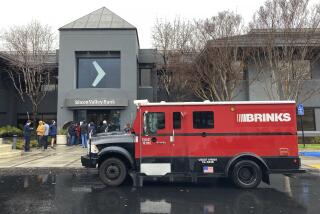Gonzalez Blasts ’88 S&L; Selloffs as ‘Giveaways’ : Thrifts: The American Savings sale was cited among those in 1988 that will cost the government $4 billion more than previously thought.
- Share via
WASHINGTON — The government’s 11th-hour sales of troubled savings and loan associations to private investors in 1988 were “giveaways,” House Banking Committee Chairman Henry B. Gonzalez (D-Tex.) said Friday.
The deals during 1988, including the sale of Stockton-based American Savings & Loan to a group led by Texas billionaire Robert M. Bass, will cost the federal government $4 billion more than previously expected because of surprisingly large losses on real estate loans, the banking committee staff reported.
One of the deals highlighted by the committee was the sale of American Savings to the Bass group, which invested $350 million in new capital into the ailing S&L;, which is now highly profitable. The Banking Committee staff report said federal assistance to the Bass group will total $5.2 billion, a substantial increase over the original estimate of $4 billion.
Gonzalez described that and other 1988 sales, many of which were completed in the last days of December, as a “a mad rush to dispose of . . . ailing and failed savings and loans.”
Now, he said, these deals “bear all the earmarks of a giveaway--with the recipients of the government largess being some of the fattest of the nation’s fat cats.”
The buyers “were obviously tough negotiators who reached for the last dollar of benefits,” Gonzalez said. “It’s just too bad that the American people didn’t have equally tough operators on their side of the table.”
The 94 S&Ls; sold in December, 1988, will cost the government about $71 billion in payments to cover losses on asset sales and tax breaks for the buyers. That is up from an original estimate of $66.9 billion.
Gonzales said the deals should be renegotiated, but the contracts seem legally unassailable unless fraud was involved in the transactions. L. William Seidman, head of the Federal Deposit Insurance Corp., told the committee, “We are not considering breaking the government’s agreements.”
A Bass group official on Friday took issue with suggestions that taxpayers’ cost of the American Savings transaction had increased because of terms of the deal. The Bass official, Bernard Carl, argued that American Savings was financially sicker, by $1.1 billion, than anyone understood when it was sold.
He blamed that condition on financier Charles W. Knapp, who headed American’s former parent firm, Financial Corp. of America. Knapp built American into the nation’s largest thrift until he was ousted by regulators in 1984.
Carl, who negotiated the acquisition for Bass in late 1988, said government and American executives believed that the S&L; had a negative net worth of $3.3 billion when the Bass group took it over. Instead, he said, that number should have been $4.4 billion because American’s real estate and other assets were worth much less than expected.
The $4.4-billion figure included nearly $2 billion in losses on commercial real estate loans and $545 million in losses on real estate that American repossessed, according to Carl. In addition, the value of American’s mortgage-backed securities--which pay investors with money from mortgage payments--was $1.3 billion less than what they cost.
Carl said the true value was discovered over a one-year period, after American’s problem assets were carved out of the thrift and put into a “bad bank” called New West Savings. Carl said S&L; files were routinely missing and checks continued arriving as payments on loans for which there were no files.
“The mess Charlie (Knapp) created is almost impossible to overstate. It was really a disaster,” said Carl.
Knapp, however, said Friday in an interview that “I’ve been gone since 1984. I would generally dispute the magnitude of the loss. If that’s true, it’s taken somebody six years to find out. I find that a little surprising.”
Knapp added: “I have been gone so long, it’s easy to cast the blame on me. As chief executive officer of the holding company (FCA), I never made a loan. It wasn’t my responsibility to make loans. I’ve never professed to be a lender. I find it remarkable that it has taken six years to find out what they found out.”
More to Read
Inside the business of entertainment
The Wide Shot brings you news, analysis and insights on everything from streaming wars to production — and what it all means for the future.
You may occasionally receive promotional content from the Los Angeles Times.










